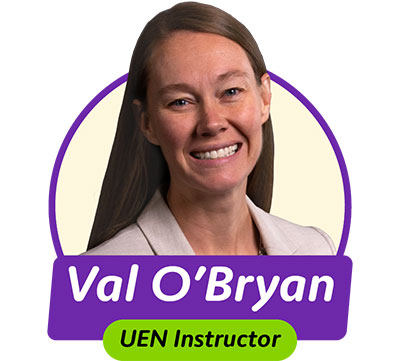UEN Teacher Tips
With the rapid rise of artificial intelligence tools, many teachers worry about their impact on student learning—will they foster growth or hinder critical thinking and creativity? You can turn AI into a beneficial tool by positioning students as the experts. Encourage them to actively engage with AI by training the tool to teach or explain concepts.
To set up a “Student as Expert” AI learning activity, check whether your school’s AI tool allows you to customize a chatbot or learning assistant. If the answer is yes, you can create a chatbot that acts as a learner, patient or someone needing guidance.
Start by crafting a specific prompt with these key elements: Role/Persona (e.g., "You are a student interacting with a teacher"), Goal (e.g., "The goal is to practice explaining a concept clearly"), Constraints (e.g., "You will ask questions but not provide answers"), and Guide (e.g., "Introduce yourself as a student, explain your need and ask four questions during the interaction"). Clear, detailed instructions ensure the chatbot facilitates meaningful learning experiences. When the chatbot is ready, give your students the link or code and let them explore.
Benefits of Centering Students as Experts in AI Interactions:
-
Deep Engagement: When students are explaining concepts to the AI chatbot, they are engaging deeply with the concept, reinforcing their own understanding and improving retention.
-
Critical Thinking: Students are put in a position where they have to use their knowledge to respond.
-
Increases Confidence: Having a chance to play the expert empowers students and boosts their confidence and ownership over their learning.
-
Promotes Reading and Writing Skills: Students use their reading and writing skills throughout the chatbot interaction, in a meaningful way.
Helpful Resource:
Six Strategies for Getting the Most from AI | UEN Teacher Tips
Assigning AI: Seven Approaches for Students, with Prompts
STUDENT USE CASES FOR AI | Part 4: AI as Learner | Challenging Students to Teach
UEN Course: AI and Student Learning
Val specializes in helping educators enhance online learning experiences. She holds a doctorate in curriculum and instruction from Kansas State University and a Master’s in Writing, Rhetoric and Digital Media studies from Northern Arizona University. Most recently, Val worked as an English and Concurrent Enrollment teacher in the Washington County School District.

Share this tip:
You Might Also Like:
- Safely Try Out AI Tools in Your Classroom
- 3 Surefire Ways To Increase Student Engagement
- Get Ready for UCET/UELMA 24 with UEN Tools
- Six Strategies for Getting the Most From AI
- Boosting End-of-Year Engagement With CCR-Centered Skills & Strategies


 UTAH EDUCATION NETWORK
UTAH EDUCATION NETWORK

 Justin
Justin Braxton
Braxton Dani
Dani Rob
Rob Val
Val

